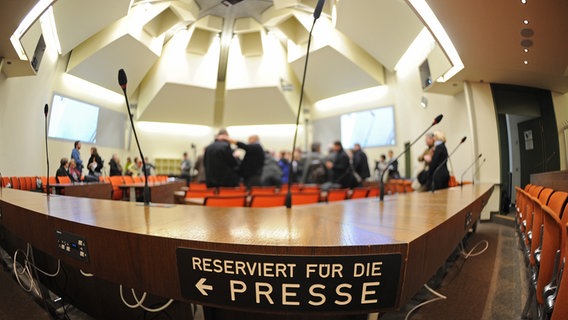
The 2021 election year in Germany is destined to be a year of heated political debates on the country’s past and future. While right-wing extremism is still on the rise in some parts of Germany, politicians and legal practitioners are more determined to combat xenophobia and violence than ever. In a new three-part series for the MGP blog, Monika Preuß, research collaborator at the Technical University of Dortmund, directs our attention at a radio documentation of Germany’s largest trial of right-wing terrorism to this date.
You can read this post in the original German here.
This short three-part blog series takes a look at radio plays on the crimes of the National Socialist Underground (Nationalsozialistischer Untergrund, NSU) and the failure and problems during the investigations and the court proceedings. Until now eight radio plays have been produced. This shows that radio plays are, next to films and television documentations (see the posts from Kumars Salehi from 1/20 and 1/21), an essential part of the artistic media’s engagement with these topics. The scope of the radio play is big. It is a “documentary” radio play project with 24 episodes (Part I) that specifically investigate the acoustic aspects of the trial, as well as the diversity of voices and the simultaneous loss of voices in social discourse (Part II), while shedding light on the individual murders and crimes committed and the effects they had on the victims (Part III).
The right-wing terror of the NSU remained undiscovered for a long time. Between 2000 and 2006 NSU members murdered nine persons with turkish and greek background and one police officer. At first the police investigated in the direction of drug crimes and organized criminality and neglected evidence that points to the organization’s racist ideology. The connections were not drawn until Uwe Mundlos and Uwe Böhnhardt had committed suicide after an unsuccessful bank robbery, and after Beate Zschäpe had turned herself to the police after burning the house she shared with Mundlos and Böhnhardt. The subsequent NSU Trial from May 6, 2013 to July 11, 2018 was, with over one hundred persons involved, the largest trial of right-wing terrorism in Germany. The public and media worldwide observed the court proceedings and closely traced the role of the Federal Office for the Protection of the Constitution (Bundesamt für Verfassungsschutz, BfV). It was widely discussed why the authorities were not able to prevent or at least reveal those crimes. Not all aspects could be clarified, and the trial became a lengthy proceeding due to procedural measures and conflicts between the main defendant, Beate Zschäpe, and her lawyers. Beate Zschäpe was sentenced to life imprisonment for arson, membership in a terrorist organization, complicity in ten murders, robberies, and two bomb attacks. The co-defendants were sentenced to imprisonments between two and a half and ten years.
The very recent production of “Saal 101 – Dokumentarhörspiel zum NSU-Prozess” by ten radio stations led by Bavarian Broadcasting is based on the notes and comments of court reporters from ARD and Deutschlandfunk. The transcripts of the court proceedings were dubbed by actors and sometimes also by the reporters themselves. Some short interview parts with the scenario editor of the radio play and the court reporters complement the texts. The radio play is named after the “Saal A 101,” in which the court proceedings took place. “Saal 101” consists of 24 parts. With each episode lasting about thirty minutes, it is the longest radio play on the NSU. The radio play is not organized chronologically, but thematically. Some focus on single defendants, some on the murders and the bomb attacks. Others reveal different stages of Beate Zschäpe, Uwe Böhnhardt, and Uwe Mundlos’s life in the underground. The role of the BfV is also featured in two episodes.
The first episode – “Die Mitschriften” – thematizes the process of producing the radio play. The narrative process takes place through a thematic compilation of 6,000 pages of audio transcripts into different sections. One of the actors also directly names the process of turning the spoken testimonies into notes and then back into spoken words (cf. 1/24, 10:03ff.). This is necessary because filming and audio recordings are not allowed during German court proceedings.
David Mayonga, a self-proclaimed “Afro-Bajuvare” (1/24, 00:20; Bajuvare here refers to being from Bavaria), introduces every episode, sums up the main issues discussed, and sometimes also draws connections to other episodes. He speaks directly to the listener and also uses the pronoun “we” throughout the episodes while raising questions such as why it took so much time for the authorities to discover the right-wing extremist nature of the crimes.
The radio play does not focus on single crimes in depth, but tries to paint a broad picture using the court proceedings as the central point. It reiterates many elements from existing media reports, but also facilitates new impressions and insights through a direct address to the audience and its thematically oriented format.
“Saal 101” was first aired on February 19 and 20, 2021. It was also published in CD format and is available for download at https://www.br.de/mediathek/podcast/saal-101/847 until February 19, 2022.


